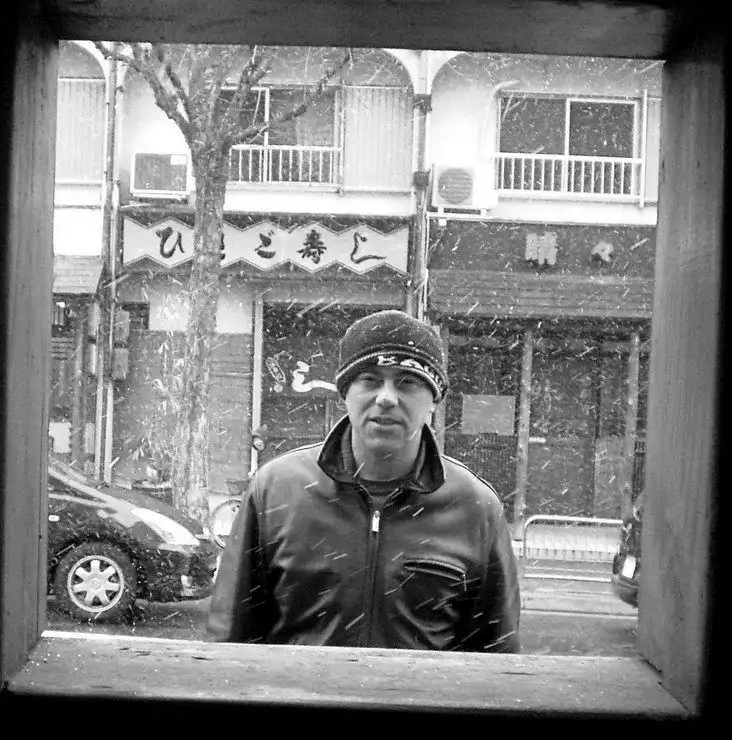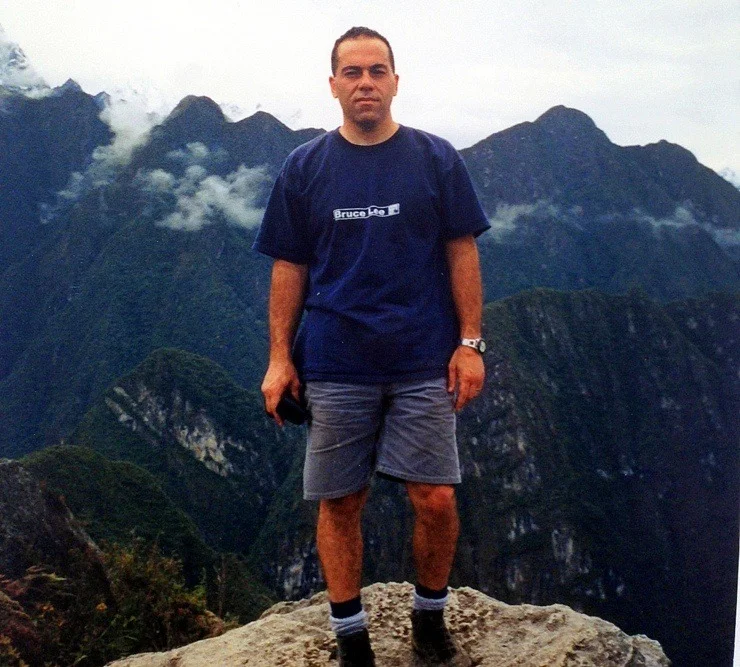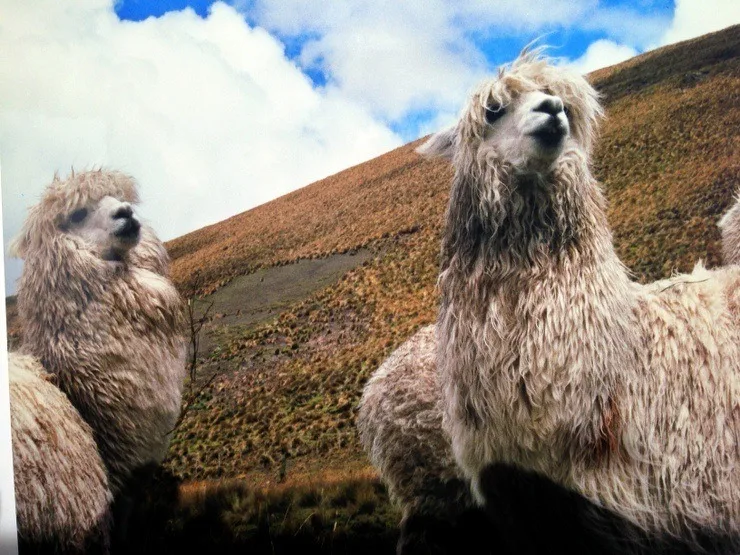Teaching Traveling: Welcome to teacher-traveler Piero Carlini! Piero, tell us about your background.
Piero: I’ve been teaching and traveling for 30 years— in fact, like many a poor soul, it was traveling that made me a teacher in the first place, as I began teaching EFL to support my abominable habit.
I’ve taught in many different countries: Italy, Saudi Arabia, Korea and most recently on a teaching exchange program in Nagoya, but principally I’ve been teaching in urban high schools near downtown Los Angeles.
TT: Love it! Tell us more about your travels.
P: There were three reasons I went to Ecuador: to climb Mount Chimborazo, to decide, once and for all, whether this sort of travel was ethically and intellectually justifiable, and to write a book presenting my conclusions.
TT: How did you find this travel opportunity?
P: I was determined to climb Chimborazo ever since I saw Edwin Alonzo Church’s paintings of this volcano. That, and the idea that it is actually the highest mountain on Earth, i.e. the part of the lithosphere that pierces farthest into the atmosphere (because it rests on the Equatorial bulge), was sufficient motivation for another foolish jaunt.
It’s always some trivial thing that sets me off: the sound of a word (Zanzibar), the remoteness on a map (Aitutaki)…
TT: So poetic! How do you fund your travels?
P: As always, a meager pittance savagely hoarded from wife and kids, without compunction, supplied my needs.
TT: Tell us one moment from your travels that was particularly powerful or funny.
P: Picture a cerulean afternoon in the Andes. Summer clouds drifting over the glaciated peaks. While hiking along a lonely trail, I suddenly was confronted by five strapping horses with sunburned Caucasians sprawled astride them.
The last, passing me, read the motto on my T-shirt out loud, remarking, “Hmm. Grindelwald Ski Patrol. Just what we need.” And well might he have laughed at my cap too, which boasted the flag of Cambodia, or that fancy kerchief knotted around my neck, proclaiming Tanzania as the “birthplace of man.” I contained multitudes that morning, I really did, and was promptly ashamed of myself. But how proud I once was to have “knocked off” all these places!
At that moment, truly, I became aware of the “lessons” I still had to teach, starting with myself. In the rest of this article I’d like to focus on our responsibility as teachers, to our hosts. What lessons should we carry with us?
TT: Great! How have your travels impacted you as a teacher, and in your career?
P: For a long time, traveling was the only thing that made teaching in the USA tenable— vacation– means everything to beings afflicted with, as Melville puts it, “an endless itch for things remote.” Teaching was just something I did to pay for my airfare until I started traveling in Latin America.
Since I knew the language, I was able to immerse myself more deeply into the troubles and hopes of my hosts, and was able to recognize, for the first time, just how unconscious my third-world travels had been: to invest with spurious meaning my complete dependence on the goodwill of these strangers, a people systematically thwarted from the promises of flourishing life which flowed, largely, from the Western cult of meritocracy— promises stifled by the acts and complicity of the West in the corruptions and failures of their own local governance— to brandish in their faces the boundless liberty, excess, and good fortune of my contingent birth— all came to see a cruel trick.
I realized, at last, the only way to make up for it was to become an impassioned advocate of change in my own community, at least, where, as an ESL teacher, I serve immigrants from countries just like Ecuador. My affinity with my students has grown by leaps and bounds. I became a better teacher, through conviction.
TT: So well put. How have your travels impacted you as a person?
P: Again and again, my travels have ruined careers and homes, supplanting conformism again and again with the only real ecstasy I am capable of, to which I stubbornly cling, regardless of innocent bystanders. At last, though, I have been forced to acknowledge that travel is an error, if not a sin.
Always being anxious to add to our stock of experiences is a form of material greed, and nothing else. It is a not a spiritual quest nor a true intellectual venture, and this, in addition to the environmentalist arguments against jet travel, should be a warning to all would-be blithe spirits on the road.
As for concrete impacts, well, on my way up Chimborazo, I was robbed of my boots, money, passport and gear near the summit of the mountain. I barely managed to make it home.
TT: Wow! What advice do you have for teachers who are dreaming of travel, or travelers dreaming of teaching?
P: There are three main points that come to mind. First of all, one must spurn the delusional sense of intellectual entitlement that Western travelers have assumed since Rousseau’s day— the idea that we can, by merely geographic means, truly enlighten ourselves, however hypnotic, is false.
Second, the connection we make with the native people has proven a vector of cultural pollution and anxiety so overpowering as to outweigh any possible fraternal feelings that come of it. Digital media has done its part to shrink the world, but nothing can set the native heart to raging like a real, live spoiled-rotten Westerner displaying his full array of undeserved and mostly unacknowledged entitlements, in all their pampered glory.
It is heartless of us to nourish into flames that inchoate spark of relative deprivation set off by the Internet, TV and cinema. This is to pour salt into the colonial wounds. In a world where imperialism still thrives, to wallow in one’s pleasures while many natives live and die without seeing their own country’s “highlights” is an openly despicable act. What kind of teacher goes on teaching that lesson? And yet, helpless before my own wanderlust, I shall teach it again and again.
We all sympathize with our hosts. Perhaps, in a very limited way, our contributions to the local marketplace help some few people get a leg up. But as teachers, as intellectuals, our consciousness should go beyond that initial circle of empathy, out towards the far wider circle of justice.
Our economic effects may be petty, but in our practice as travelers, we have important lessons to teach. My final point, however, seeks to redress this. In my travels, time and again I have come across people who volunteer for charities who seek to empower and educate natives. Now what these ventures need, more than our good-natured acts, is our money.
Volunteer travel is a strange and guilt-ridden hybrid: we all know how foreign aid sustains third-world kleptocracy but feel somehow that being on the scene will somehow prevent such misprision, and well it may. Volunteer travel, while of marginal economical advantage to the country as a whole, acts as a salve to the aforementioned sense of relative deprivation nurtured in the native breast.
A volunteer, after all, is doing penance for his good fortune. That he sees the wrong of providence and aims to redress it, even trivially, goes a long way to making his own kind seem tangibly human. I applaud these efforts.
It is for this reason that, at the end of the next school year, I will throw over my place at the public trough (21 years worth) and abandon forever my middle class comforts to teach as a volunteer in Latin American schools.
I’ve done all I could at this end for immigrant students, but the stream of kids is drying up. Upward mobility has stalled in the US, and would be immigrants, even from the poorest Central American countries, now realize that to move to Los Angeles means to transfer one version of underclass existence for another, far less dignified one. I think I can do more good at the point of origin.
Your stories on Teaching Traveling have been an inspiration to me to return to the foreign classroom. This, really, is a travel-inspired dream that seems worth pursuing.
TT: Thanks so much, Piero, and best of luck in your inspiring upcoming endeavors! Readers, what questions or comments do you have?

The author, Lillie Marshall, is a 6-foot-tall National Board Certified Teacher of English from Boston who has been a public school educator since 2003. She launched TeachingTraveling.com in 2010 to share expert global education resources, and over 1.6 million readers have visited over the past decade. Lillie also runs AroundTheWorld L.com Travel and Life Blog, and DrawingsOf.com for educational art. Do stay in touch via subscribing to her monthly newsletter, and following @WorldLillie on social media!






Lydia
Thursday 18th of June 2015
Hi, can i ask, if u live at 21213 Hawthorne blvd #5386 torrance CA90503 U.S.A. before? Coz i' m looking for my friend 25 yrs ago. Thanks!
Maria
Friday 19th of July 2013
Piero - Great introduction to someone new to me and that I find inspiring. Thanks!
Piero
Thursday 18th of July 2013
No offense meant to travelers who can't control their wanderlust.